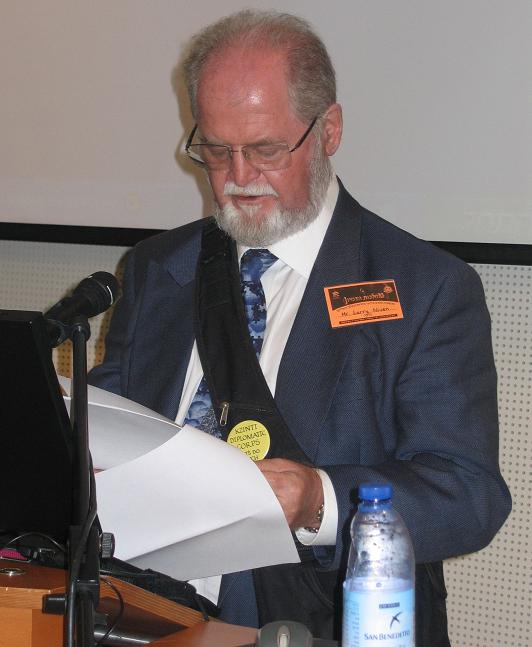The science fiction author Larry Niven, who is staying in Israel, says in an interview with the science website that Clark was a good friend and a great writer * His best book, according to Niven: The City and the Stars

Science fiction author Larry Niven, who is in Israel as a guest of the Faculty of Humanities of Bar Ilan University and the Israel Society for Science Fiction and Fantasy, was interviewed by the science website. The interview took place in the Wahl Hall at Bar-Ilan University, at the end of a meeting held by the Israeli Science Fiction and Fantasy Association and which dealt with the protection of the Earth against objects from space (we hope to decode this tape in the coming days). In any case, in the interview I planned to ask him questions about his work, but another event clouded this interview - the death last night of the old man of science fiction writers - Arthur C. Clark. I asked Niven what his response was:
"I was told that Arthur Clarke passed away last night. He is a good friend that unfortunately I have not met more often. He was a man who shaped the last century and he will be sorely missed by all of us. Half the people I know in science fiction told similar stories about Arthur Clarke helping them get stories into magazines early in their careers. "
"I remember him walking into my house in Breakwood, California and saying, 'I'm a fan of Larry Niven.' He also repeated this declaration once on a radio broadcast when asked who his favorite author was. This is something that is not usually answered, because all your other friends will be hurt. But he had enough stature to be able to do it without the friends getting hurt. It should be noted that I grew up on Arthur Clarke's books. He had a marvelous talent for showing us vast expanses of distances and times."
What is his most important contribution?
"Almost certainly this is also the best known of all - The communication satellites are in geosynchronous orbit. He envisioned the possibility of using geosynchronous orbit to place communications satellites long before anyone else thought of it. This is the orbit above the equator where satellites take 24 hours to orbit the Earth, so the satellite is over one place the whole time. "
And in the field of science fiction, what was his best book or story?
"lets see. It is difficult to choose from the many stories of such a versatile writer. In my opinion the city and the stars is a story describing a very distant future. There were also files of short stories describing life on ring-shaped space stations, and on life on the moon these were vignettes, very short stories written for important journals. He was an educator, he could tell you how things work. "
How did it affect reality, for example the news machine from the movie 2001?
I guess this machine inspired whoever designed the way we surf the Internet (AB hyper-connectivity). Arthur guessed what would be the best way to show a news summary, and the solution he came up with was to do it on a screen. "
Did he think that such a machine, i.e. the Internet as we know it, would be an everyday product?
"I don't think he or any of us anticipated how quickly it would happen. "
But are there predictions of his going much slower?
"True, the whole field of space travel is progressing much more slowly. There is a lot more hard work here than expected. The good science fiction writers predict not only the vehicles but also the traffic jams."
You have created many universes, books that are in the realm of hard science fiction. What is your best world?
"Wrote 60 books, 10 of them together with Jerry Fornell. I really like the cluster of worlds known as Medea, developed by a group of science fiction writers led by Harlan Ellison. They have developed a broad and very interesting background that can serve as a basis for many stories. As for my stories I would say that I really like the world of Destiny's road it is a world similar to Earth but different from it. It seems to me a very interesting place. The world there is called Destiny."
Not the world or the universe of integral trees?
"You're absolutely right. The integral trees and the smoke ring are the best system I've ever designed from a science teacher's perspective. They are the most rigid science fiction I have written.”
What is your impression of Israel?
"I had a lot of fun since the plane landed, or at least since I contacted my guide because I got lost at the airport. I managed to see Tel Aviv and Jaffa. I really enjoyed Jaffa. Later I will visit Megiddo (Armageddon) and Jerusalem before returning home."
As part of the questions from the audience, I asked Niven what went wrong, because in the 5s they thought that today we would fly into space on regular commercial flights, and he answered: "There is an anecdote that talks about one of the managers of NASA, during his time he ordered to focus exclusively on the space shuttle and even gave an order to burn all the plans of the heavy rocket Saturn XNUMX. Congress ended up cutting the budget for the space shuttles and we have half the shuttles we needed. The basic idea is that things went to hell and no one could stop it. Government activities tend to be inconsistent. There are friends who dream that some asteroid will explode over NASA, that we will start over not only with the facilities but also with the people."
